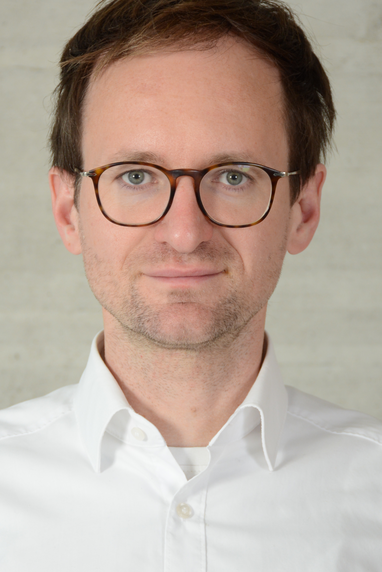Prof. Dr. Bastian Schröter
Professor

Energietechnik/-wirtschaft, Treibhausgasbilanzierung
- Nachhaltige Energietechnik
Regionale und urbane Energiesysteme, Dekarbonisierung von Energiesystemen,
Treibhausgasbilanzierung, Wasser-Energie-Wechselwirkungen
Vita
-
Seit 2016
Professor für Energietechnik
-
2014-16
Projektleiter Technologiebenchmarking, Siemens Corporate Technology, München
-
2010-12
Promotion (Dr. rer. nat.), Wissenschaftszentrum Umwelt, Universität Augsburg (AG Prof. Dr. A. Reller). Thema: "Investigation of interdependencies of water and greenhouse gas emission pathways at country level"
-
2008-14
Berater und Projektleiter, McKinsey & Co., München
-
2002-07
Studium der Physik (Dipl.-Phys.), Universität Jena, Universität Grenoble, LMU München; Diplomarbeit: "Molecular Recognition with Toroidal Microcavities", Max-Planck-Institut für Quantenoptik, Garching (AG Prof. Dr. T.W. Hänsch)
-
2003-2005
Praktika bei Siemens Management Consulting, München, Siemens VDO Automotive, Gainesville, GA, USA, Centre de Recherche Atomique, Grenoble
-
2001
Abitur in Freiberg am Neckar
Forschung
![[Bild: HFT Stuttgart] SektorSim3 Logo](/fileadmin/Dateien/Forschung/Projekte/Projektlogos/SektorSim3_Logo.png)
2023-25
NeuLand: Neue Nachhaltigkeitsprozesse und nachhaltiges Nutzerverhalten für Landesliegenschaften
![[Bild: Logo-Neuland/Flaticon.com]](/fileadmin/Dateien/Forschung/_processed_/9/6/csm_NeuLand_Logo_ef787c5329.png)
2022-25
CircularGreenSimCity: Ganzheitlich-ressourceneffiziente Betrachtung von Stadtquartieren
![[Bild: HFT Stuttgart]](/fileadmin/Dateien/Forschung/_processed_/4/0/csm_CircularGreenCity_logo_RGB_553bbcc684.jpg)
2020-23
W4RES: Scaling up the involvement of women in supporting an accelerating market uptake of renewable energy sources for heating and cooling (EU Horizon, LC-SC3-RES-28-2018-2019-202)
2020-22
Smart E-Park: SmartGrid E-Parkhaus Langer Graben Schwäbisch Hall (BWPLUS – Baden-Württemberg Programm Lebensgrundlage Umwelt und ihre Sicherung)
2019-21
EnSys-LE: Energiesystemanalyse – Lokale Energiemärkte als Bindeglied zwischen regionaler und zentraler Energiewende (BMWi, FKZ 03ET4061B); Partner: ewi Research & Scenarios
2019-21
3%+: Umsetzung des energieeffizienten Sanierungsfahrplans für kommunale Quartiere (BMWi, FKZ 03ET1635A); Partner: Deutscher Verband für Wohnungswesen, Städtebau und Raumordnung e.V., B.&S.U. Beratungs- und Service-Gesellschaft Umwelt
2018-21
INSOURCE: INtegrated analysis and modeling for the management of sustainable urban Food-Water-Energy ReSOURCEs (BMBF, FKZ 01LF1802A); Partner: Landkreis Ludwigsburg, AH Consult, Austrian Institute of Technology GmbH, Universität für Bodenkultur Wien, City University of New York – CUNY Institute of Urban Systems and CUNY Energy Institute (RFCUNY), New York Institute of Technology (NYIT)
2018-21
MUSI: Multi-Scale Urban Scenario Interface (BMBF, FKZ 13FH9E02IA)
2018-20
SimStadt 2: EnEff:Stadt – 3D-Simulation urbaner Energiesysteme (BMWi, FKZ 03ET1459A); Partner: M.O.S.S. Computer Grafik Systeme GmbH, GEF Ingenieur AG, Stadtwerke Stuttgart GmbH, Mainzer Stadtwerke AG(abgeschlossen)
Veröffentlichungen
-
ResearchGate
https://www.researchgate.net/profile/Bastian-Schroeter/research
-
Google Scholar
https://scholar.google.com/citations?user=hpdGY-EAAAAJ&hl=de
Weiteres
Klimainnovationsrat der Landeshauptstadt Stuttgart - Mitglied
Studienstiftung des deutschen Volkes - Alumni